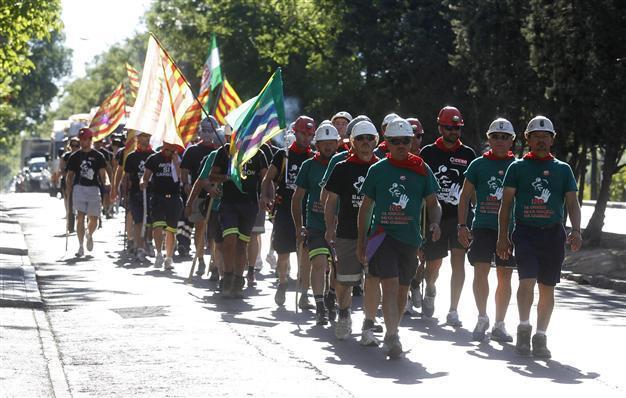Coal miners march into Madrid to protest cuts
MADRID - Agence Frence-Presse

Coal miners walk during the last stage of their "Marcha Negra" (Black March) in Madrid, July 10, 2012. REUTERS photo
Spanish coal miners marched into Madrid on Tuesday on the eve of a major demonstration against cuts to pit subsidies that they say will destroy thousands of jobs.
Violent clashes have broken out in more than a month of protests over Madrid's decision to slash coal industry subsidies this year to 111 million euros ($142 million) from 301 million euros last year.
Unions say the cuts will destroy coal mining, which relies on state aid to compete with cheaper imports, and threaten the jobs of around 8,000 coal miners and up to 30,000 other people indirectly employed by the sector.
"The fight is for something just, we are just coming to claim what is ours," said Manuel Cinoceda, a 55-year-old miner from Teruel who took early retirement.
He was one of 60 miners who marched from the northern region of Aragon and entered the capital from the northeast chanting, "Here they are, these are the coal miners" and "Madrid is burning." The Aragon marchers will join up later in the day in Madrid with another column of protesters from two other northern mining regions: Asturias and Castile and Leon.
Later in the evening they will march to the city centre in their mining clothes and with their lamps lit ahead of a larger demonstration on Wednesday when unions say they expect 25,000 people.
Weary from the hike, some of the Aragon protesters wore red scarves and black T-shirts reading "They want to end it all" or "No to the closure of coal mining," as some passers-by shouted "Courage" and "Strength to you." Their progress through Madrid's streets after a two-week journey on foot of more than 400 kilometres (250 miles) was hailed by car drivers beeping their horns and some fire engines sounding their sirens.
"Except for a few towns, we have been very warmly welcomed almost everywhere," said Antonio Risco, 52, who joined the Aragon marchers after leaving the Cordoban mining region of Guadiato de Penarroya.
"We have to make this government realise that the mining regions have to survive and coal, too, because it is a native energy, which comes from the country and is cheap," said Risco, who retired after 22 years' work.
Many towns have nothing else, said Francisco Martin, a 35-year-old miner from the northern town of Arino.
"If they close this, there is nothing. They have had many years to re-industrialise but they have done nothing. If they close the mine, they throw us out and where are we going to go if there is nothing?" Spain's mines have been gradually closing over the past 20 years. Only around 40 are still active, mostly in the north, and they employ about 8,000 miners as well as sustaining other jobs indirectly.
But Spanish coal's state subsidies must by eliminated by 2018 under European Union agreements.
"If they don't have 160 million for it to carry on now, what are they going to give us up to 2018?" Martin asked, taking a jab at the billions of euros spent on rescuing crisis-hit Spanish lender Bankia.
The Aragon marchers applauded news that some of their fellow miners would emerge to join Wednesday's protest after staying underground for weeks in their mines in protest at the cuts.
